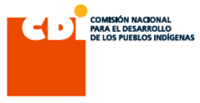- National Commission for the Development of Indigenous Peoples
-
The National Commission for the Development of Indigenous Peoples (Spanish: Comisión Nacional para el Desarrollo de los Pueblos Indígenas, CDI) is a decentralized agency of the Mexican Federal Public Administration. It was founded in 2003 as a replacement for the National Indigenist Institute (INI). It has its headquarters in Mexico City and, since 15 December 2006, has been headed by former senator Luis H. Álvarez.
Contents
Creation and replacement of the INI
The law creating the Commission came into effect on 5 July 2003. At the same time, the 1948 law creating the National Indigenist Institute (Instituto Nacional Indigenista) was repealed; thus, the Commission took over the functions and responsibilities of the defunct Institute.[1]
Mission
The Commission's remit lays with the nation's indigenous peoples. Its mission is to "guide, coordinate, promote, support, foster, monitor, and assess programmes, projects, strategies, and public actions to attain integral and sustainable development and full enjoyment of the rights of indigenous peoples and communities in accordance with Article 2 of the Political Constitution of the United Mexican States."
Operations
The Commission operates in 24 states through 10 Coordinating Centres for Indigenous Development; a Research, Information, and Documentation Centre; and 28 Regional Indigenous Development Centres. It maintains a network of 1085 school hostals (albergues escolares), used to provide mid-week accommodation for pupils for whom it is too far to travel to school every day, and it also operates the Cultural Indigenist Broadcasting System (SRCI) which runs 20 multilingual radio stations on medium-wave (AM) frequencies, with a further seven low-power stations in the very high frequency band (FM) on an experimental basis.
References
-
- INALI [Instituto Nacional de Lenguas Indígenas] (14 January, 2008). "Catálogo de las lenguas indígenas nacionales: Variantes lingüísticas de México con sus autodenominaciones y referencias geoestadísticas" (PDF online facsimile). Diario Oficial de la Federación (México, D.F.: Imprenta del Gobierno Federal, SEGOB) 652 (9): 22–78 (first section),1–96 (second section),1–112 (third section). OCLC 46461036. http://www.inali.gob.mx/pdf/CLIN_completo.pdf. (Spanish)
- Pellicer, Dora; Bábara Cifuentes, and Carmen Herrera (2006). "Legislating diversity in twenty-first century Mexico". In Margarita G. Hidalgo (ed.). Mexican Indigenous Languages at the Dawn of the Twenty-first Century. Contributions to the sociology of language, no. 91. Berlin: Mouton de Gruyter. pp. 127–168. ISBN 978-3-11-018597-3. OCLC 62090844.
External links
Categories:- Commissions of Mexico
- Indigenous peoples in Mexico
- 2003 in Mexico
-
Wikimedia Foundation. 2010.

